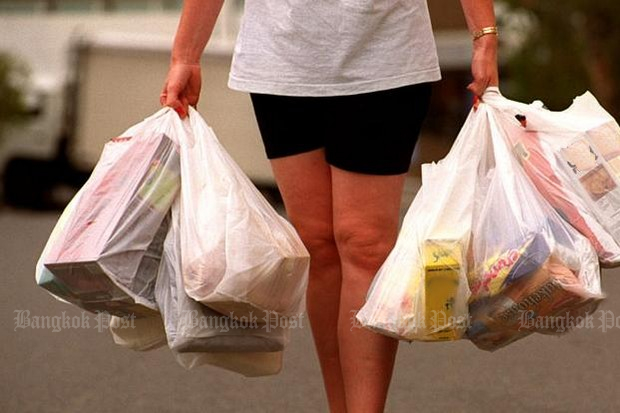
"It's inconsistent with reality," shoppers and traders cried as they continue to ignore a state campaign to reduce one-time-use plastic bags that began on Saturday.
In the latest effort to curb the use of plastic waste, the government focused on fresh markets, blaming them for producing massive amounts of this kind of waste.
It's a far cry from success; a failure, I would say. As my colleagues reported on Saturday from Klong Toey market, one of the busiest trading places in the country, it's business as usual for shoppers and traders who stubbornly said "no" to the campaign, saying it's not convenient.

Ploenpote Atthakor is editorial pages editor, Bangkok Post.
According to the report, not a single Thai shopper thought twice when demanding a plastic bag even for dry food (which can be put in a tote bag), and sometimes sought two bags for one item, like seafood or fish (which can be avoided, should they prepare old bags for re-use). The traders, in turn, feel the need to satisfy their customers.
Am I surprised with the failure? Not a bit. Everybody cited inconvenience. It's too difficult to get out of one's house with a cloth bag or used plastic bags, to use as substitutes for new bags when shopping. Well, there may be shoppers who care, but they are too few to count.
One vegetable vendor noted that only foreigners bring cloth bags. This is interesting. Only Thais find it too difficult to embrace a green, responsible life-style.
What surprises me is: Why do state authorities continue to cling on to the same old methods that take them to nowhere? How many campaigns have they conducted against plastic bags and failed, only to go back to square one time and time again? Don't they have an ability to learn from their mistakes?
We all know Thais love convenience and will not trade it off unless they are forced to. As they balked at the campaign, saying it's "not inconsistent with reality".
But in making an excuse not to reduce one-time-use plastic bags, Thais turn a blind eye to this crucial fact: Thailand is among the top five countries that generate more than half of plastic waste in the world, according to a 2015 Ocean Conservancy report. The other four "champions" are China, Indonesia, the Philippines and Vietnam. The agency said about eight million tonnes of plastic waste are dumped into the world's oceans every year, the equivalent of one garbage truck of plastic being tipped into the sea every minute of every day.
Those who continue to use these kind of bags choose not to care about this fact: There are impacts on health, not just animals but to humans. Something called microplastic contamination is real.
While complaining about inconvenience, they forget to think about this, too: More and more countries are up in arms against plastic bags, and some take on the fight and win. It's unfortunate the authorities have ignored this fact. May I remind them those countries are governed by elected politicians, not a military regime with enormous power like Thailand.
I once wrote about the experience of Kenya which waged a war on plastic bags -- the very same item that wrecks our environment -- last August. In fact, Kenya is a latecomer in Africa on this issue. Countries like Rwanda, Cameroon, Eritrea, Tanzania and Morocco, to name but a few, set an impressive example long before that East African country.
Kenya's environmental agency, Nema, opted for extreme measures, so extreme that no recycling or reuse of this kind of bag is allowed. And the penalty is harsh. Anyone with a one-time-use bag in possession will face a hefty fine, up to four million shillings (about 1.3 million baht) and imprisonment even for possession of such a bag. Wasn't there any complaint about such a harsh measure? In fact, there were complaints. Those in the industry even threatened job losses.
But Kenya pressed on with the effort. Nema allowed for another type of better-for-the environment plastic bags made of polypropylene. And these cloth-like bags are not free. Shoppers have to buy every single bag they ask from traders who have no hesitation to push the burden to buyers. If you want a bag, you have to pay for it.
And, as the Kenyan experience shows, money always makes people think twice. With strong enforcement, the one-time-use items disappeared overnight.
A number of countries around the world have learned this and act accordingly.
Our Asean friend, Indonesia, which faces the same plastic pollution problem has a plan to impose excise taxes on plastic bags this year. The fight against plastic bags is not easy, but it's not impossible.
Only a lameduck government allows its people to make a lame excuse for an irresponsible lifestyle.
